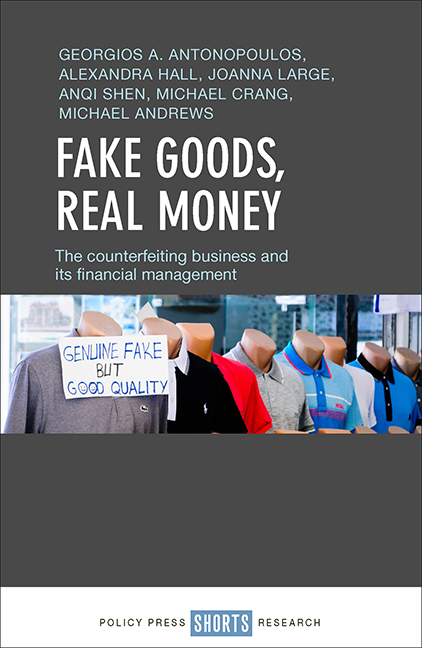Book contents
two - Methodology and fieldwork
Published online by Cambridge University Press: 12 April 2022
Summary
This short book is based on the findings from a 12-month interdisciplinary, cross-sector, exploratory project. This brought together a team of academics from the social sciences (criminology and sociology), humanities (geography) and law with practitioners from the National Trading Standards e-Crime Team (NTSeCT). The team provided a range of skills and expertise that benefited the research, including a list of contacts involved in the counterfeit trade and its mitigation. The team was involved in collecting and analysing data on the trade in the UK and China, and the processes and practices involved in its financing.
Recognising the value of different sources of data, the research adopted a mixed-methods approach. The combined expertise of the research team was utilised to incorporate approaches from the social sciences, law and humanities. The involvement of the non-academic project partner from the inception of the research ensured that the research was realistic and relevant beyond academia. The research took place in two phases, which allowed the project to develop iteratively. As we will see in what follows, a staged approach was essential for this kind of exploratory project.
Phase 1: Review of available literature and content analysis of media sources
The first phase of the research involved a literature review, focused on providing the research team with a better understanding of the complex business models associated with the trade in counterfeit products. Alongside the relatively small body of published academic literature, the review included: (1) research reports by academics, research institutes, governments and national and international law enforcement reports (Europol, Interpol, National Crime Agency, etc): and (2) reports by international organisations (United Nations Office on Drugs and Crime [UNODC] and FATF [Financial Action Task Force]), professional associations and private companies that have been either affected by specific types of counterfeiting (eg British American Tobacco) or commissioned by a client to conduct research on a specific market (eg KPMG). Open sources also included media sources; of particular relevance here were press releases from law enforcement agencies, including Her Majesty's Revenue and Customs (HMRC), the Medical and Healthcare Products Regulatory Agency (MHRA) and National Trading Standards. The advantage of the multilingual team meant that Chinese- and Greek-language documents could also be included. Counterfeiting-related information and statistics in the Chinese literature were obtained in published scholarly work that was gathered from the China National Knowledge Infrastructure (CNKI) – the largest academic database in the Chinese language.
- Type
- Chapter
- Information
- Fake Goods, Real MoneyThe Counterfeiting Business and its Financial Management, pp. 9 - 14Publisher: Bristol University PressPrint publication year: 2018



